-
 Bitcoin
Bitcoin $118600
-1.16% -
 Ethereum
Ethereum $3616
-2.94% -
 XRP
XRP $3.174
-10.23% -
 Tether USDt
Tether USDt $1.000
0.01% -
 BNB
BNB $773.4
-0.42% -
 Solana
Solana $189.3
-6.58% -
 USDC
USDC $1.000
0.02% -
 Dogecoin
Dogecoin $0.2406
-10.24% -
 TRON
TRON $0.3098
-1.24% -
 Cardano
Cardano $0.8139
-9.10% -
 Hyperliquid
Hyperliquid $44.01
-2.71% -
 Stellar
Stellar $0.4266
-9.64% -
 Sui
Sui $3.699
-7.29% -
 Chainlink
Chainlink $18.21
-6.60% -
 Hedera
Hedera $0.2465
-9.46% -
 Bitcoin Cash
Bitcoin Cash $512.3
-2.27% -
 Avalanche
Avalanche $24.03
-5.62% -
 Litecoin
Litecoin $112.2
-5.21% -
 UNUS SED LEO
UNUS SED LEO $8.964
-0.26% -
 Shiba Inu
Shiba Inu $0.00001386
-9.81% -
 Toncoin
Toncoin $3.188
-4.76% -
 Ethena USDe
Ethena USDe $1.001
-0.02% -
 Polkadot
Polkadot $4.135
-7.84% -
 Uniswap
Uniswap $10.16
-5.19% -
 Monero
Monero $310.5
-2.84% -
 Bitget Token
Bitget Token $4.702
-2.53% -
 Dai
Dai $0.0000
0.01% -
 Pepe
Pepe $0.00001270
-9.07% -
 Aave
Aave $290.7
-5.84% -
 Bittensor
Bittensor $424.7
-5.28%
Compare IBIT vs FBTC vs ARKB
Bitcoin ETFs like IBIT, FBTC, and ARKB offer investors exposure to Bitcoin with varying fees, structures, and liquidity, making it essential to compare expense ratios, tracking methods, and tax implications before investing.
Jul 17, 2025 at 09:29 pm
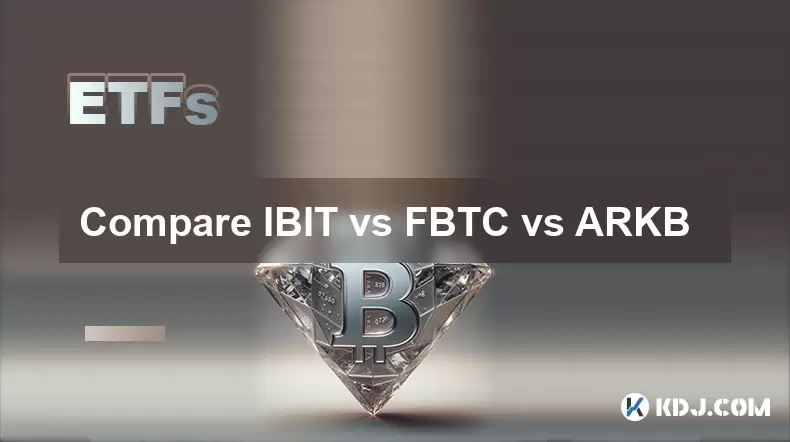
Understanding the Basics of Bitcoin ETFs
Bitcoin Exchange-Traded Funds (ETFs) have become a popular way for investors to gain exposure to Bitcoin without directly holding the cryptocurrency. Among the most talked-about options are IBIT, FBTC, and ARKB. These funds track the price of Bitcoin but differ in structure, fees, and performance characteristics. Understanding these differences is crucial for making informed investment decisions.
Each of these ETFs operates under different management strategies and expense ratios. For instance, IBIT (iShares Bitcoin Trust) is managed by BlackRock, one of the largest asset managers globally. FBTC (Fidelity Wise Origin Bitcoin Fund) is backed by Fidelity Investments, while ARKB (ARK 21 Shares Bitcoin ETF) is a collaboration between ARK Invest and 21Shares. These distinctions influence how each fund performs and how it might fit into an investor’s portfolio.
Fees and Expense Ratios: A Key Differentiator
One of the most significant factors when comparing IBIT vs FBTC vs ARKB is the fee structure. Investors must consider the expense ratio, which directly impacts long-term returns. As of recent data:
- IBIT has an expense ratio of 0.12%, which is relatively low compared to other crypto ETFs.
- FBTC initially launched with a 0% expense fee until mid-2024, after which it increased to 0.25%.
- ARKB carries an expense ratio of 0.21%, slightly higher than IBIT but lower than FBTC post-promotional period.
These fees may seem minor, but over time, they can significantly affect returns. Therefore, investors who plan to hold these ETFs for the long term should pay close attention to these costs.
Tracking Methodology and Underlying Assets
Another important aspect to compare is how each ETF tracks Bitcoin. While all three aim to mirror the price of Bitcoin, their underlying methodologies vary:
- IBIT holds physical Bitcoin stored in cold storage through regulated custodians. This approach reduces counterparty risk.
- FBTC also holds physical Bitcoin and emphasizes transparency and security through its custodial partnerships.
- ARKB utilizes a combination of direct Bitcoin ownership and futures contracts to maintain its exposure.
The use of futures contracts in ARKB could lead to tracking discrepancies during periods of high volatility or backwardation in the futures market. In contrast, both IBIT and FBTC aim for more direct correlation due to their reliance on physical holdings.
Liquidity and Trading Volume
Liquidity plays a critical role in ETF trading, especially for investors who want to enter or exit positions quickly without affecting the price. High trading volumes generally indicate better liquidity and tighter bid-ask spreads.
- IBIT has consistently shown the highest average daily trading volume among the three, often surpassing $1 billion in daily turnover.
- FBTC follows closely behind, benefiting from Fidelity’s strong retail presence.
- ARKB typically trades at lower volumes compared to the other two, though it remains sufficiently liquid for most investors.
Higher liquidity means investors can trade these ETFs more efficiently, especially during volatile market conditions. Therefore, those prioritizing ease of entry and exit may lean toward IBIT or FBTC.
Premiums and Discounts to Net Asset Value (NAV)
An essential yet often overlooked factor is whether the ETF trades at a premium or discount to its Net Asset Value (NAV). This metric reflects how the market values the fund relative to its actual Bitcoin holdings.
- IBIT tends to trade very close to its NAV, thanks to its large size and efficient creation/redemption mechanism.
- FBTC has historically experienced slight premiums, particularly in the early stages of its launch.
- ARKB occasionally shows small deviations from NAV, influenced by supply-demand imbalances in the secondary market.
Investors should monitor these premiums or discounts because buying at a premium could reduce potential gains if the price reverts to NAV.
Tax Considerations and Investor Structure
Each ETF has unique tax implications based on its structure. In the U.S., most Bitcoin ETFs are structured as grantor trusts, meaning investors are treated as direct owners of the underlying Bitcoin.
- IBIT is a grantor trust, so investors receive a K-1 tax form and are subject to collectibles tax treatment (up to 28% capital gains rate).
- FBTC also uses a grantor trust structure and follows similar tax rules.
- ARKB was originally structured as a commodity pool and issued Form 1099, but it later converted to a grantor trust structure, aligning more closely with IBIT and FBTC.
This structural change affects reporting requirements and potential tax liabilities, so investors should consult with a tax professional before investing.
FAQs
Can I hold IBIT, FBTC, or ARKB in my retirement account?
Yes, all three ETFs can be held in standard brokerage accounts, including IRAs and 401(k)s, provided your custodian allows investments in cryptocurrency-related products.
Which ETF offers the best custody solution for Bitcoin?
All three ETFs utilize reputable custodians—BlackRock for IBIT, Fidelity for FBTC, and third-party partners like Coinbase for ARKB. Each claims robust security measures, including cold storage and insurance.
Do these ETFs pay dividends?
No, Bitcoin ETFs do not pay dividends because Bitcoin itself does not generate income. Any gains come solely from changes in the ETF’s net asset value.
Is there a minimum investment required for these ETFs?
There is no formal minimum investment. Since they trade like stocks, you can purchase as little as one share, depending on your broker's policies.
Disclaimer:info@kdj.com
The information provided is not trading advice. kdj.com does not assume any responsibility for any investments made based on the information provided in this article. Cryptocurrencies are highly volatile and it is highly recommended that you invest with caution after thorough research!
If you believe that the content used on this website infringes your copyright, please contact us immediately (info@kdj.com) and we will delete it promptly.
- Dogecoin's Resistance Retest: Parabolic Move on the Horizon?
- 2025-07-24 04:50:13
- WLFI, Vaulta Token, and Holdings: Navigating the Web3 Revolution
- 2025-07-24 05:30:13
- BlockDAG, Dogecoin, and the $350M Presale Frenzy: What's Hot Now?
- 2025-07-24 04:50:13
- Ethereum, Meme Coins, and Presale Funding: What's the Hype?
- 2025-07-24 05:30:13
- Ethereum Meme Coin Presales: Hype or the Future?
- 2025-07-24 05:35:13
- ADA's Rocky Ride: Support Levels and Open Interest Under Scrutiny
- 2025-07-24 05:35:13
Related knowledge
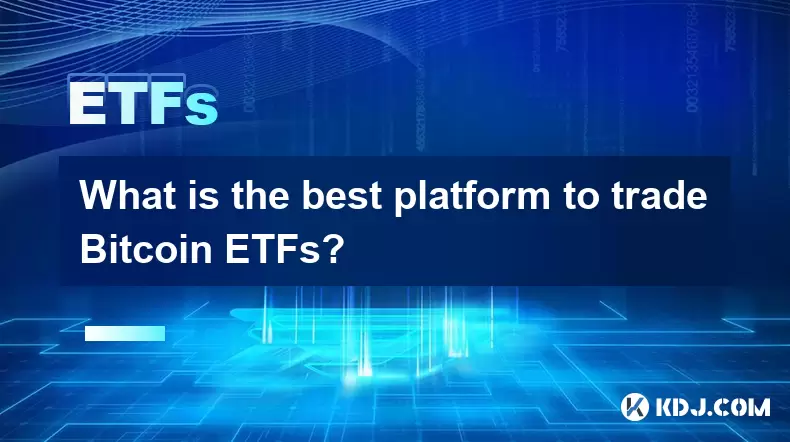
What is the best platform to trade Bitcoin ETFs?
Jul 23,2025 at 04:14am
Understanding Bitcoin ETFs and Their Role in TradingBitcoin Exchange-Traded Funds (ETFs) have gained significant traction among traditional and crypto...
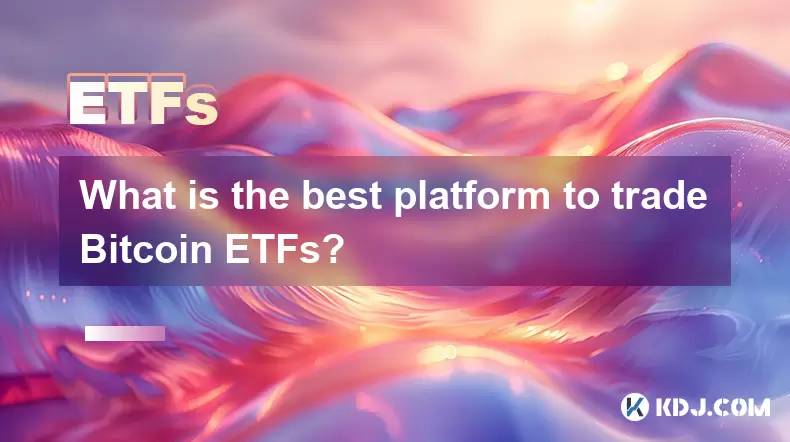
What is the best platform to trade Bitcoin ETFs?
Jul 17,2025 at 03:50pm
Understanding Bitcoin ETFs and Their Role in the MarketBitcoin Exchange-Traded Funds (ETFs) are investment vehicles that track the price of Bitcoin wi...
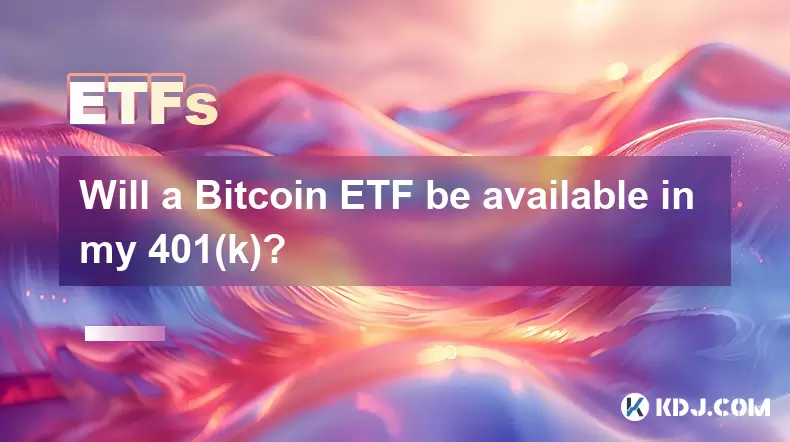
Will a Bitcoin ETF be available in my 401(k)?
Jul 17,2025 at 10:42pm
What is a Bitcoin ETF?A Bitcoin ETF (Exchange-Traded Fund) is an investment vehicle that tracks the price of Bitcoin without requiring investors to di...
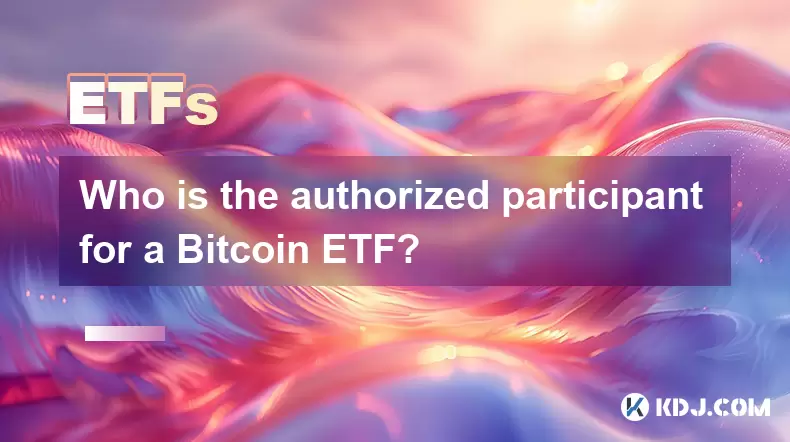
Who is the authorized participant for a Bitcoin ETF?
Jul 18,2025 at 12:42am
Understanding the Role of Authorized Participants in Bitcoin ETFsIn the context of Bitcoin Exchange-Traded Funds (ETFs), an authorized participant (AP...
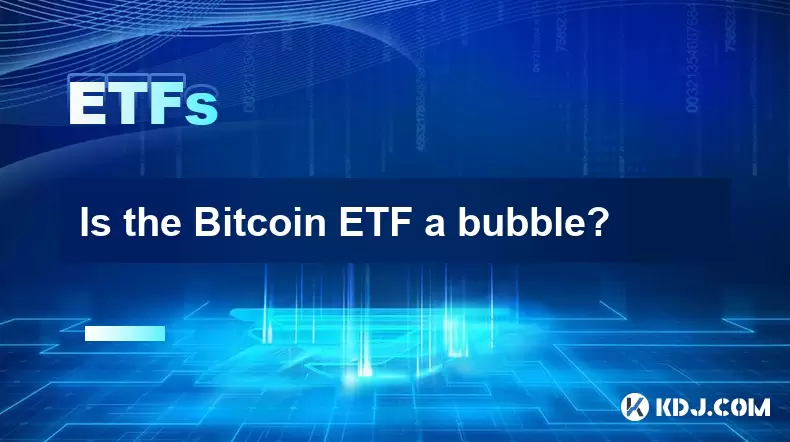
Is the Bitcoin ETF a bubble?
Jul 20,2025 at 06:57am
Understanding the Bitcoin ETF ConceptA Bitcoin Exchange-Traded Fund (ETF) is a financial product that aims to track the price of Bitcoin without requi...
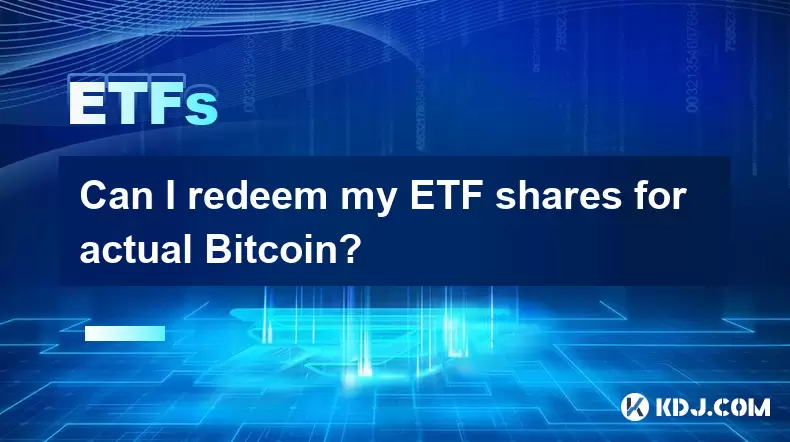
Can I redeem my ETF shares for actual Bitcoin?
Jul 17,2025 at 03:14pm
Understanding ETF Shares and Their Relation to BitcoinExchange-Traded Funds (ETFs) have become a popular investment vehicle for those looking to gain ...

What is the best platform to trade Bitcoin ETFs?
Jul 23,2025 at 04:14am
Understanding Bitcoin ETFs and Their Role in TradingBitcoin Exchange-Traded Funds (ETFs) have gained significant traction among traditional and crypto...

What is the best platform to trade Bitcoin ETFs?
Jul 17,2025 at 03:50pm
Understanding Bitcoin ETFs and Their Role in the MarketBitcoin Exchange-Traded Funds (ETFs) are investment vehicles that track the price of Bitcoin wi...

Will a Bitcoin ETF be available in my 401(k)?
Jul 17,2025 at 10:42pm
What is a Bitcoin ETF?A Bitcoin ETF (Exchange-Traded Fund) is an investment vehicle that tracks the price of Bitcoin without requiring investors to di...

Who is the authorized participant for a Bitcoin ETF?
Jul 18,2025 at 12:42am
Understanding the Role of Authorized Participants in Bitcoin ETFsIn the context of Bitcoin Exchange-Traded Funds (ETFs), an authorized participant (AP...

Is the Bitcoin ETF a bubble?
Jul 20,2025 at 06:57am
Understanding the Bitcoin ETF ConceptA Bitcoin Exchange-Traded Fund (ETF) is a financial product that aims to track the price of Bitcoin without requi...

Can I redeem my ETF shares for actual Bitcoin?
Jul 17,2025 at 03:14pm
Understanding ETF Shares and Their Relation to BitcoinExchange-Traded Funds (ETFs) have become a popular investment vehicle for those looking to gain ...
See all articles

























































































